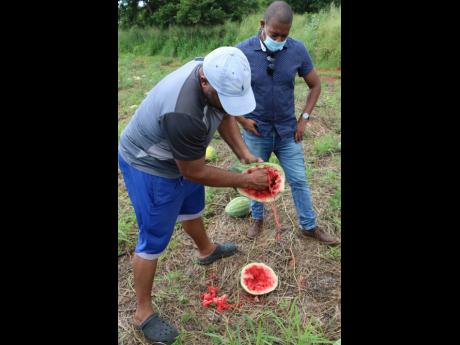Tough times ahead, but farmers up to the challenge – Green
Minister of Agriculture Floyd Green is well aware that while there is the need for urgent action to address the concerns of farmers hard hit by the ongoing heavy rain across the country, with more showers projected for the island, a quick fix is not the solution. What is needed most of all is a diversification of farming practices in a structured, sustainable manner that anticipates and prepares for the kind of adverse weather now impacting the island.
Following Saturday’s tour of sections of western parishes, including his constituency of St Elizabeth South, Green told The Gleaner that the ongoing weather conditions bear testimony to the harsh and devastating realities of climate change, hence the need to incorporate modern farming techniques and technologies with traditional methods. Describing them as very challenging times with farmers having suffered significant losses, “every challenge presents an opportunity”, he said.
“We definitely have to look at how we can ensure that we our farmers are diversifying their methodologies so that they are using open field along with protective farming which is critical, but you also have to look at the reality of our agriculture set-up,” he said.
The reality is that with most Jamaican farmers operating on small acreages, diversifying their crop output could serve them better, Green suggested.
PROVIDE MORE GUIDANCE
“We saw that some crops suffered a complete loss, while some are still resilient because they are better in the rain. So we are going to have to look at how we provide more guidance to our farmers as to how they go about mixing their crops.” However, he said the country has been through much worse devastation from weather systems, including Hurricane Ivan which hit Jamaica in 2004.
“Most of my farmers in the southern end of the island will tell you that Hurricane Ivan still stands out as one of their worst experiences. What you find when you go on a lot of the farms is that the Jamaican farmers have the ability to recover, and to recover stronger than before. So despite this major setback, a number of them have already started to clean up their fields and are beginning to get planting again. While a number of them are seeing what they can salvage because they understand that while this is a challenge, if they are able to salvage any of their crops, it’s an opportunity for the marketing of their crops.”
Minister Green pointed out that while the main purpose of the tour was get a first-hand look and gauge the extent of the damage to the livestock and crop sectors, he was seeing much more.
“One of the reasons I like these tours is that you not only get a first-hand view of the level of devastation, but you also get to see the spirit of the farmer, and the spirit of the farmer is encouraging, resilient and says that if we work together we will do even better when we come back.
“So from where we sit at the ministry now, it is how can we ensure that we quickly get some support to the farmers that are most in need. Clearly, we have seen farms of different sizes but the problem is widespread and our small farmers usually have a harder time to rebound, but they are critical to the success of our agricultural sector. So we will have to quickly get planting materials, seeds, fungicides, pesticides to them so that they can salvage what they can and quickly rebound.”

